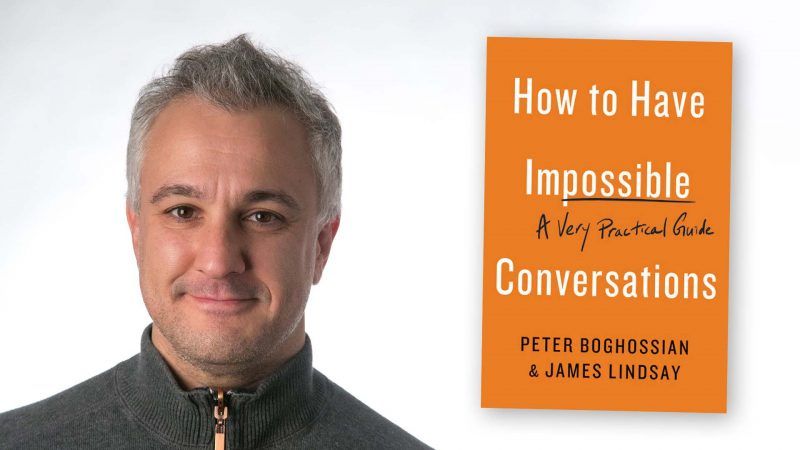How To Have Impossible Conversations in Terrible Times
In a new book, Peter Boghossian, one of the perpetrators of the "grievance studies" hoax, outlines how ideological opponents can reach common ground.

It's hard to think of a time when political and cultural discourse has been more polarized. These days, it seems as if even casual conversation has become tougher to navigate than a World War II minefield. Everyone from prospective Saturday Night Live cast members to college professors teaching books on racism to social media folk heroes have been canceled for saying the wrong thing at the wrong time and holiday dinners occasion endless columns about surviving political discussions. In today's world, "Can we all just get along?"—the phrase famously attributed to Rodney King after he was almost beaten to death by members of the Los Angeles Police Department in 1991—seems like it's from a totally different universe.
Today's guest, Peter Boghossian, hopes to remedy at least some of today's toxic atmosphere. He's an assistant professor of philosophy at Portland State University and the co-author, with James Lindsay, of the new book How To Have Impossible Conversations: A Very Practical Guide. Their aim is to give us all advice on how to have "effective, civil discussions about today's most divisive issues."
Boghossian talks with Nick Gillespie about strategies to bring people who disagree into useful, productive engagement with one another. They also discuss how Boghossian, Lindsay, and a third scholar, Helen Pluckrose, pulled off the "grievance studies" hoax, one of the biggest and most controversial academic controversies in recent memory. The trio authored 20 fake articles that they say exemplify how political correctness has trumped serious intellectual inquiry in many academic disciplines. These were not subtle satires: One talked about canine "rape culture" at dog parks and another appropriated aspects of Hitler's Mein Kampf in the service of a feminist critique of patriarchy. They submitted the papers to academic journals, with seven being accepted for publication and four actually coming out when they were exposed by The Wall Street Journal.
Is there a contradiction between pulling off the hoax and writing a book about bringing ideological opponents together? And what punishment at Portland State does Boghossian still face as a result of his role in the hoax? Those are some of the questions raised in this wide-ranging conversation about politics, polarization, and intellectual inquiry.
Audio production by Ian Keyser.


Show Comments (38)